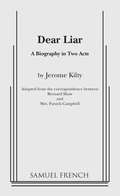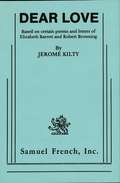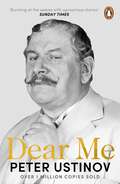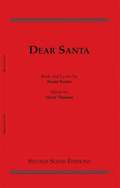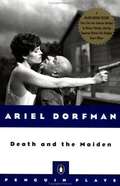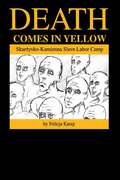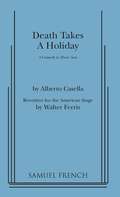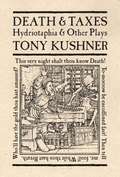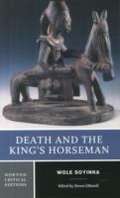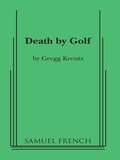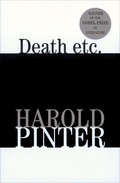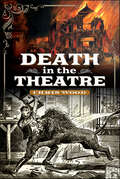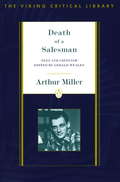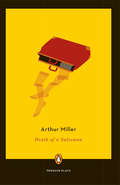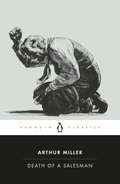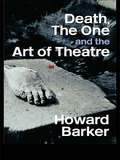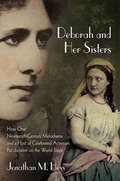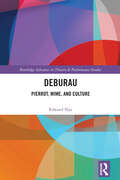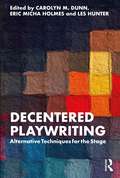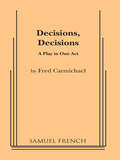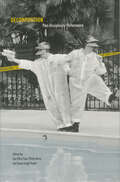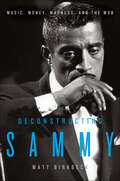- Table View
- List View
Dear Evan Hansen: The Novel
by Val Emmich Steven Levenson Benj Pasek Justin PaulFrom the show's creators comes the groundbreaking novel inspired by the hit Broadway show Dear Evan Hansen. Dear Evan Hansen, Today's going to be an amazing day and here's why...When a letter that was never meant to be seen by anyone draws high school senior Evan Hansen into a family's grief over the loss of their son, he is given the chance of a lifetime: to belong. He just has to stick to a lie he never meant to tell, that the notoriously troubled Connor Murphy was his secret best friend. <p><p> Suddenly, Evan isn't invisible anymore--even to the girl of his dreams. And Connor Murphy's parents, with their beautiful home on the other side of town, have taken him in like he was their own, desperate to know more about their enigmatic son from his closest friend. As Evan gets pulled deeper into their swirl of anger, regret, and confusion, he knows that what he's doing can't be right, but if he's helping people, how wrong can it be? No longer tangled in his once-incapacitating anxiety, this new Evan has a purpose. And a website. He's confident. He's a viral phenomenon. Every day is amazing. Until everything is in danger of unraveling and he comes face to face with his greatest obstacle: himself. <p> A simple lie leads to complicated truths in this big-hearted coming-of-age story of grief, authenticity and the struggle to belong in an age of instant connectivity and profound isolation.
Dear Evan Hansen: Through the Window
by Steven LevensonWinner of 6 Tony Awards!The official behind-the-scenes book of the new hit musical.A letter that was never meant to be seen, a lie that was never meant to be told, a life he never dreamed he could have. Evan Hansen is about to get the one thing he's always wanted: a chance to finally fit in. Both deeply personal and profoundly contemporary, DEAR EVAN HANSEN is a new American musical about life and the way we live it.The book-produced by Melcher Media, the team behind Hamilton, Wicked, Rent, and many more-tells the story of the musical from its conception nearly a decade ago to the Broadway stage. From developing the idea to writing the show, composing, casting, and rehearsals, DEAR EVAN HANSEN appeals to fans far and wide offering them the opportunity to continuously revisit the show, and for those who haven't seen the musical, reading the book will make them feel like they have.Filled with interviews with the cast and crew, original behind-the-scenes photography, a deeper look into Evan's fictional world and the visual world of the show, unreleased lyrics, and of course the libretto, as well as reflections on the creators own formative memories from their adolescence as it relates to the show's themes, and important examinations of how we present ourselves online and mental health, DEAR EVAN HANSEN is a beautifully produced, thoughtful, and uplifting book.
Dear Liar
by Bernard Shaw Mrs Patrick Campbell Jerome KiltyBiography / 1m, 1f / Shining in the bewitching repartee between two great wits, Katharine Cornell and Brian Aherne played Mrs. Campbell and Shaw on Broadway. The play toured this hemisphere and Europe for two years before its return to Off-Broadway. It is a masterful compendium of badinage with Shaw and Mrs. Campbell in scenes of both confrontation and distancing. Here is Shaw in all his contradictions; he adores the actress, Mrs. Campbell, most ascetically, and persuades her to play in Pygmalion. He frets with her when she leaves for America, and yet he refuses permission to publish the letters that would save her from bankruptcy. Mrs. Campbell is his match; she published them anyway. Here is a strange and intriguing romance fought around the world.
Dear Love
by Jerome KiltyBiography / 1m, 1f / As the hit play Dear Liar drew on the life-long correspondence of Bernard Shaw and Mrs. Patrick Campbell, author Jerome Kilty uses the poems and letters of Elizabeth Barrett and Robert Browning, to present this compelling portrait of a couple whose words and love are legendary. First corresponding via letters, when Elizabeth thinks of Browning as merely "an acquaintance", his poetry moves her so deeply they eventually meet. Chastised by her stern father and guilty over the death of her beloved brother, Elizabeth is bereft and isolated. Browning begins to court her and she is finally persuaded to marry and accompany him to Italy, where their love might grow away from the over-watchful eyes of her antagonistic, Victorian father. Elizabeth Barrett loved Robert Browning beyond all enduring; Dear Love recounts the ways.
Dear Me
by Peter Ustinov‘Very amusing’Daily MirrorBeloved wit and raconteur, star of stage and screen, multitalented writer, director and humanitarian – few stars of the twentieth century were as highly regarded as Sir Peter Ustinov.From his birth in April 1921, this highly acclaimed autobiography spans Ustinov’s extraordinary career as the star of Spartacus, Quo Vadis, Death on the Nile and many other classics. Eccentric relatives, school masters and manic Hollywood moguls are all brought unforgettably to life alongside encounters with the great and the good, from Sir Laurence Olivier to J. B. Priestley.This warm and revealing book gives an enthralling portrait of a man whose unique gift of laughter made him one of the most popular and respected entertainers in the world.
Dear Santa
by Norm FosterSanta Claus tries to fulfill a child's special Christmas wish while his staff attempts to overcome a supply shortage at the North Pole. This is a laugh-filled holiday play innocent enough for the youngest boy or girl, and entertaining enough for adults.
Death And The Maiden
by Ariel DorfmanAriel Dorfman's explosively provocative, award-winning drama is set in a country that has only recently returned to democracy. Gerardo Escobar has just been chosen to head the commission that will investigate the crimes of the old regime when his car breaks down and he is picked up by the humane doctor Roberto Miranda. But in the voice of this good Samaritan, Gerardo's wife, Paulina Salas, thinks she recognizes another man--the one who raped and tortured her as she lay blindfolded in a military detention center years before.
Death Comes in Yellow
by Felicja KarayDeath Comes in Yellow" presents the history of one slave labor camp in order to shed light on all aspects of the slave labor camps established in Poland under German occupation. Hasag-Skarzysko was one of hundreds of camps scattered throughout occupied Poland. They were distinguished by size, the nationality of the prisoners, their location, the date of their establishment, and the authority in charge. The large number of labor camps reflected the German policy of exploiting the work forces of the occupied countries. These camps were part of a Europe-wide system of forced labor.The first part of this volume reviews the external history of the camp. The second section, which studies the internal workings of the camp, is quite different in approach and includes an analysis of prisoner society and a moving description of the individual prisoner's struggle to survive.
Death Takes a Holiday
by Alberto CassellaDrama / Casting: 7m, 6f / Scenery: Interior Produced with great success on Broadway, this striking drama has established itself among the important plays of our time. It is based on the poetic conception of death suspending all activities for three days during which he falls in love with a beautiful girl and through her realizes why mortals fear him. The mood of the play is established with remarkable skill and while it is charged with exciting moments, it is a perfect background for a love story that is as simple as it is appealing. The character who symbolizes Death is a very human person, with no conventional claptrap dragged in for mere effect. Here is a play that stimulates discussion and presents a novel and optimistic philosophy of the problems of love and death. This is one of the most popular and successful plays for amateurs.
Death and Taxes
by Tony KushnerTony Kushner: "This is an odd assemblage of plays, for which gathering-together there is no overarching thematic justification. Because several of the plays deal with death, and one of the death-plays deals as well with money, and the last play deals with taxation, we're calling the book Death & Taxes. But all plays, directly or indirectly, are about death and taxes, so this title explains little..."What is clear, is that all of the plays in this new collection by Kushner are poetic masterpieces. An exploration in form and style, from comedy to farce to what can easily be called hip-hop theatre, Kushner makes each style his own, writing with the mind of a great social reformer and the heart of a poet. This collection is proof that his masterwork, Angels in America was just the beginning.Includes:Reverse Transcription: Six Playwrights Bury a SeventhHydriotaphia or The Death of Doctor BrowneG. David Schine in HellNotes on AkibaTerminating or Sonnet LXXVEast Coast Ode to Howard Jarvis
Death and The King's Horseman
by Wole Soyinka Simon Gikandi"Backgrounds and Sources" helps readers understand Death and the King's Horseman's traditional African contexts and the role of theater in African culture. Included are a map of Yoruba-land, discussions of Yoruban religious beliefs and cultural traditions, Soyinka on the various forms that theater has taken in African culture in order to survive, and Anthony Appiah on Soyinka's struggle with the problem of African identity in the creation of Death and the King's Horseman. Commentary on the play as both a theatrical production and a classroom text is provided by Gerald Moore, Tanure Ojaide, and Martin Rohmer. "Criticism" collects nine major essays on the play and the difficulties it presents to readers. Contributors include D. S. Izevbaye, Eldred Durosimi Jones, Henry Louis Gates Jr. , Biodun Jeyifo, Wole Soyinka, Joan Hepburn, Adebayo Williams, David Richards, and Olakunle George. A Chronology and Selected Bibliography are also included.
Death by Golf
by Gregg KreutzCharacters: 2 male, 2 femaleInterior When an escaped convict, an anxious bride, a scheming new husband, and a suspicious attorney all convene at Grandpa's house--it doesn't take long for Grandpa to realize he has to reschedule his golf game. This lively combination of uproarious comedy and terrifying murder mystery revolves around the uncanny resemblance between escaped convict Tony and recent bridegroom Prescott (both played by the same actor). Newlywed Ashley's desperate attempt to figure out who is the real murderer is sometimes helped and sometimes hindered by her golf-fanatic grandfather and a mysterious visiting attorney named Muriel. As the suspense mounts and the violence intensifies, Ashley slips into increasing hysteria, Muriel discovers the murderer's evil agenda, and Grandpa, drawing upon an unsuspected hidden reserve of inner strength, fine-tunes his stroke. "A hilarious fast-paced romp!" - Charlie Cox, Danville Advocate-Messenger
Death etc.
by Harold PinterA collection of political essays, poetry, and dramatic works by the Nobel Prize–winning playwright and author of Betrayal. Throughout his life, playwright, poet, and political activist Harold Pinter has consistently cast light on the hypocrisy of power and those who would defend the status quo for the sake of their own security and comfort. Awarded the Wilfred Owen Prize in 2004 for his poetry condemning US military intervention in Iraq, Mr. Pinter has succeeded in combining his artistry with his political activism. Death etc. brings together Pinter’s most poignant and especially relevant writings in response to war. From chilling psychological portraits of those who commit atrocities in the name of a higher power, to essays on the state-sponsored terrorism of present-day regimes, to solemn hymns commemorating the faceless masses that perish unrecognized, Mr. Pinter’s writings are as essential to the preservation of open debate as to our awareness of personal involvement in the fate of our global community.
Death in the Theatre
by Chris Wood"A richly entertaining account of tragic theatre accidents and murders most foul. If theatre walls could talk, what secrets would they reveal? Chris Wood provides fascinating answers with tales of brawling ushers, murderously jealous husbands, stampeding crowds and infant tragedies. A meticulously researched and vivid collection of lives lost in the palaces of dreams. A must-read for all lovers of the theatre, providing shocks and gasps of horror when real life proves to be more dramatic than any play on stage." - Hugh Bonneville "Immaculately researched and beautifully macabre. This is a real treat for anyone who is either a fan of the theatre or of untimely deaths. I loved it!" - Peter James Britain’s theatrical wonderland has been a cornerstone of culture for centuries, delighting and thrilling audiences with an assemblage of exhilarating spectacles. Beyond the trodden boards, and tucked neatly behind the curtain however, lies a catalogue of real life destruction and grisly murder that our greatest tragedians would surely be proud to have presided over. Tread the bloodied boards of Britain’s theaters and witness the deathly dramas that have played out so dramatically within them. Death in the Theatre collects an astonishing selection of startling tragedies from Britain’s throng of theaters. There is something especially staggering when the player exits life on their adorned stage, and yet, with this by no means an infrequent occurrence, death has made many a fearful cameo appearance – stalking the stalls and grimly reaping the galleries in its macabre and relentless fashion. In 1910 a strange midnight tragedy was enacted in a London theater, where the brutal murder of an elderly stage carpenter prompted huge excitement among the theater-going world and indeed wider public. How did a children’s magic show descend into such unspeakable horror that would leave 183 youngsters dead in a Sunderland theater, their tiny bodies brutally laid out in the dress circle for the bleakest of identity parades? Learn of outrageous tragedy such as the young man mauled to death by a lion in a Gloucester theater, and the unfortunate victim killed in the Dumfries Theatre Royal – quite literally – by the limelight.
Death of a Salesman
by Arthur Miller Gerald WealesThe Pulitzer Prize-winning tragedy of a salesman's deferred American dream Ever since it was first performed in 1949, Death of a Salesman has been recognized as a milestone of the American theater. In the person of Willy Loman, the aging, failing salesman who makes his living riding on a smile and a shoeshine, Arthur Miller redefined the tragic hero as a man whose dreams are at once insupportably vast and dangerously insubstantial. He has given us a figure whose name has become a symbol for a kind of majestic grandiosity--and a play that compresses epic extremes of humor and anguish, promise and loss, between the four walls of an American living room."By common consent, this is one of the finest dramas in the whole range of the American theater." --Brooks Atkinson, The New York Times"So simple, central, and terrible that the run of playwrights would neither care nor dare to attempt it." --Time
Death of a Salesman: Certain Private Conversations In Two Acts And A Requiem (Penguin Plays)
by Arthur MillerThe Pulitzer Prize-winning tragedy of a salesman's deferred American dream Ever since it was first performed in 1949, Death of a Salesman has been recognized as a milestone of the American theater. In the person of Willy Loman, the aging, failing salesman who makes his living riding on a smile and a shoeshine, Arthur Miller redefined the tragic hero as a man whose dreams are at once insupportably vast and dangerously insubstantial. He has given us a figure whose name has become a symbol for a kind of majestic grandiosity--and a play that compresses epic extremes of humor and anguish, promise and loss, between the four walls of an American living room."By common consent, this is one of the finest dramas in the whole range of the American theater." --Brooks Atkinson, The New York Times"So simple, central, and terrible that the run of playwrights would neither care nor dare to attempt it." --Time
Death of a Salesman: Certain Private Conversations in Two Acts and a Requiem (Penguin Twentieth-century Classics Ser.)
by Arthur Miller Christopher W. BigsbyThe Pulitzer Prize-winning tragedy of a salesman's deferred American dream Ever since it was first performed in 1949, Death of a Salesman has been recognized as a milestone of the American theater. In the person of Willy Loman, the aging, failing salesman who makes his living riding on a smile and a shoeshine, Arthur Miller redefined the tragic hero as a man whose dreams are at once insupportably vast and dangerously insubstantial. He has given us a figure whose name has become a symbol for a kind of majestic grandiosity--and a play that compresses epic extremes of humor and anguish, promise and loss, between the four walls of an American living room."By common consent, this is one of the finest dramas in the whole range of the American theater." --Brooks Atkinson, The New York Times"So simple, central, and terrible that the run of playwrights would neither care nor dare to attempt it." --Timeof the finest dramas in the whole range of the American theater." --Brooks Atkinson, The New York Times "So simple, central, and terrible that the run of playwrights would neither care nor dare to attempt it." --Time For more than sixty-five years, Penguin has been the leading publisher of classic literature in the English-speaking world. With more than 1,500 titles, Penguin Classics represents a global bookshelf of the best works throughout history and across genres and disciplines. Readers trust the series to provide authoritative texts enhanced by introductions and notes by distinguished scholars and contemporary authors, as well as up-to-date translations by award-winning translators.
Death, The One and the Art of Theatre
by Howard BarkerDeath, The One and the Art of Theatre is the latest collection of Barkers distinctive and revelatory philosophical musings on theatre. It is a stunning array of speculations, deductions, prose poems and poetic aperçus that casts a unique and unflinching light on the nature of tragedy, eroticism, love and theatre. Exploring the juncture between aesthetics and metaphysics, the book looks at the human experience of love and death as life at its most intrinsically theatrical. Howard Barker is an internationally renowned playwright whose works are regularly produced throughout Europe and the US. He is widely known for his controversial explorations into contemporary tragedy and his anti-Brechtian focus on the irrational and the catastrophic. He is often credited as a major influence on the generation of playwrights that includes Sarah Kane. Death, The One and the Art of the Theatre is a profoundly unsettling and inspiring piece of writing and extends the challenge to orthodox morality that Barker first presented in Arguments for a Theatre, a challenge he describes as men and womens secret longing for the incomprehensible nature of pain.
Deborah and Her Sisters: How One Nineteenth-Century Melodrama and a Host of Celebrated Actresses Put Judaism on the World Stage
by Jonathan M. HessBefore Fiddler on the Roof, before The Jazz Singer, there was Deborah, a tear-jerking melodrama about a Jewish woman forsaken by her non-Jewish lover. Within a few years of its 1849 debut in Hamburg, the play was seen on stages across Germany and Austria, as well as throughout Europe, the British Empire, and North America. The German-Jewish elite complained that the playwright, Jewish writer S. H. Mosenthal, had written a drama bearing little authentic Jewish content, while literary critics protested that the play lacked the formal coherence of great tragedy. Yet despite its lackluster critical reception, Deborah became a blockbuster, giving millions of theatergoers the pleasures of sympathizing with an exotic Jewish woman. It spawned adaptations with titles from Leah, the Forsaken to Naomi, the Deserted, burlesques, poems, operas in Italian and Czech, musical selections for voice and piano, a British novel fraudulently marketed in the United States as the original basis for the play, three American silent films, and thousands of souvenir photographs of leading actresses from Adelaide Ristori to Sarah Bernhardt in character as Mosenthal's forsaken Jewess.For a sixty-year period, Deborah and its many offshoots provided audiences with the ultimate feel-good experience of tearful sympathy and liberal universalism. With Deborah and Her Sisters, Jonathan M. Hess offers the first comprehensive history of this transnational phenomenon, focusing on its unique ability to bring Jews and non-Jews together during a period of increasing antisemitism. Paying careful attention to local performances and the dynamics of transnational exchange, Hess asks that we take seriously the feelings this commercially successful drama provoked as it drove its diverse audiences to tears. Following a vast paper trail in theater archives and in the press, Deborah and Her Sisters reconstructs the allure that Jewishness held in nineteenth-century popular culture and explores how the Deborah sensation generated a liberal culture of compassion with Jewish suffering that extended beyond the theater walls.
Deburau: Pierrot, Mime, and Culture (Routledge Advances in Theatre & Performance Studies)
by Edward NyeThis volume analyses the nature of the mime art of Deburau and of the pantomime performances of the Théâtre des Funambules in Paris in the context of Romantic art, literature and socio-political thought. Deburau and the Théâtre des Funambules are characteristic of Romantic art in that they are closely associated with certain aspirations for social reform, even revolution. Deburau was an iconic figure for intellectuals such as George Sand who effectively considered him to be part of the ‘poète-maçon’ movement. Edward Nye examines this fascination as well as the myth which developed from it. With its unique framing in art, literature and politics, this book is a must read for undergraduates and postgraduates in theatre, literary studies, and the Romantic period.
Decentered Playwriting: Alternative Techniques for the Stage
by Carolyn M. DunnDecentered Playwriting investigates new and alternative strategies for dramatic writing that incorporate non-Western, Indigenous, and underrepresented storytelling techniques and traditions while deepening a creative practice that decenters hegemonic methods. A collection of short essays and exercises by leading teaching artists, playwrights, and academics in the fields of playwriting and dramaturgy, this book focuses on reimagining pedagogical techniques by introducing playwrights to new storytelling methods, traditions, and ways of studying, and teaching diverse narratological practices. This is a vital and invaluable book for anyone teaching or studying playwriting, dramatic structure, storytelling at advanced undergraduate and graduate levels, or as part of their own professional practice.
Decisions Decisions
by Fred CarmichaelComedy / 3 m., 1 f. / Bare stage w. 2 set pieces / This funny and bittersweet play catches a moment in the life of Troy Watkins, an indecisive single woman in her thirties who lives alone in New York City. She meets an intriguing stranger in the park, a man who looks like a tramp but obviously is well educated...What has reduced him to his current state? Drugs? Financial difficulties? Crime? As they share thoughts and get to know each other, Troy decides to trust him. Is she right or wrong? The answer lies in a very funny yet poignant conclusion.
Declarations
by Jordan TannahillWinner of the 2017 Toronto Theatre Critics Award for Best New Canadian PlayWinner of three Dora Mavor Moore AwardsStage Award for Best Performance, 2017 Edinburgh Festival FringeMouthpiece follows one woman, for one day, as she tries to find her voice. Two performers express the inner conflict that exists within a modern woman's head: the push and pull, the past and the present, the progress and the regression. Interweaving a cappella harmony, dissonance, text, and physicality, Mouthpiece is a harrowing, humorous, and heart-wrenching journey into the female psyche.
Decomposition: Post-Disciplinary Performance (Unnatural Acts: Theorizing the Performative)
by Sue-Ellen Case, Philip Brett, and Susan Leigh Foster“A collection of essays in a variety of disciplines that confront oppressed, marginalized, and invisible space . . . an astonishing array of material.” —Theatre Research InternationalThe fluid nature of performance studies and the widening embrace of the idea of performativity have come together in Decomposition to produce a collection that crosses disciplinary lines of academic work. The essays move from the local to the global, from history to sport, from body parts to stage productions, and from race relations to global politics.In the title essay, Elizabeth Wood writes about a basic human relation cast around the question of performance and triangulated by the role that a great performer took within it. Together these essays pursue critical understandings of performance in our postmodern world.Contributors include Philip Brett, Sue-Ellen Case, Susan Leigh Forster, Amelia Jones, Kristine C. Kuramitsu, George Lipsitz, Catherine Lord, Ronald Radano, Timothy D. Taylor, Jeffrey Tobin, Deborah Wong, Elizabeth Wood, and B. J. Wray“Presents interpretive interventions of a more localized, materially and institutionally anchored, and ultimately more specific and powerful nature.” —TDR/The Drama Review
Deconstructing Sammy: Music, Money, and Madness
by Matt BirkbeckSammy Davis Jr. lived a storied life. Adored by millions over a six-decade-long career, he was considered an entertainment icon and a national treasure. But despite lifetime earnings that topped $50 million, Sammy died in 1990 near bankruptcy. His estate was declared insolvent, and there was no possibility of itever using Sammy's name or likeness again. It was as if Sammy had never existed. Years later his wife, Altovise, a once-vivacious woman and heir to one of the greatest entertainment legacies of the twentieth century, was living in poverty, and with nowhere else to go, she turned to a former federal prosecutor, Albert "Sonny" Murray, to make one last attempt to resolve Sammy's debts, restore his estate, and revive his legacy. For seven years Sonny probed Sammy's life to understand how someone of great notoriety and wealth could have lost everything, and in the process he came to understand Sammy as a man whose complexity makes for a riveting work of celebrity biography as cultural history.Matt Birkbeck's serious work of investigative journalism unveils the extraordinary story of an international celebrity at the center of a confluence of entertainment, politics, and organized crime, and shows how even Sammy's outsized talent couldn't save him from himself.


